11 Best Herbal Teas For High Cholesterol
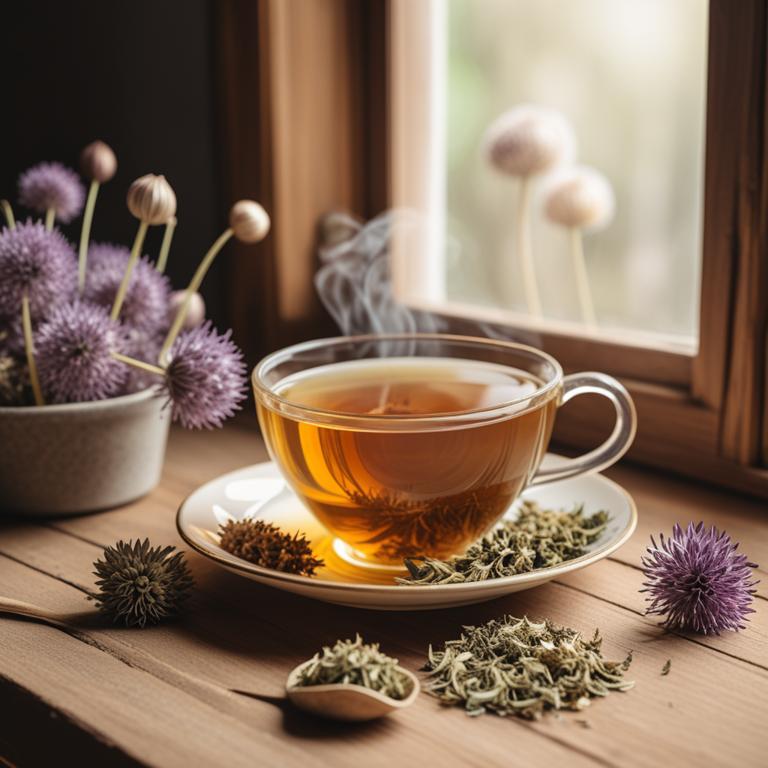
Herbal teas for high cholesterol are a type of plant-based remedy used to lower cholesterol levels and reduce the risk of heart disease.
These teas are rich in antioxidants, flavonoids, and other nutrients that help to reduce bad cholesterol, improve blood circulation, and prevent the formation of plaque in the arteries.
Examples of herbal teas that have been traditionally used to treat high cholesterol include peppermint tea, which helps to improve digestion and reduce inflammation; ginger tea, which has anti-inflammatory properties and aids in reducing blood pressure; turmeric tea, which contains curcumin that reduces inflammation and improves lipid profiles; ginseng tea, which helps to improve blood circulation and reduce stress; and green tea, which is rich in catechins that aid in reducing bad cholesterol and improving overall cardiovascular health.
By incorporating these herbal teas into their daily routine, individuals can potentially reduce their cholesterol levels and minimize their risk of heart disease.
According to "Avicenna journal of phytomedicine", teas for high cholesterol may be beneficial, as sour tea has been shown to decrease total cholesterol, HDL-C, and LDL-C levels by up to 9.46%, 8.33%, and 9.80% respectively after 12 weeks of consumption.
Below there's a list of the 11 best herbal teas for high cholesterol.
- 1. Gymnema sylvestre teas
- 2. Curcuma longa teas
- 3. Zingiber officinale teas
- 4. Panax ginseng teas
- 5. Aloe vera teas
- 6. Cynara scolymus teas
- 7. Rosmarinus officinalis teas
- 8. Silybum marianum teas
- 9. Foeniculum vulgare teas
- 10. Cichorium intybus teas
- 11. Cassia auriculata teas
Also you may be interested in...
TODAY'S FREE BOUNDLE
Herb Drying Checklist + Herbal Tea Shopping List + Medicinal Herbs Flashcards
Enter you best email address below to receive this bundle (3 product valued $19.95) for FREE + exclusive access to The Aphotecary Letter.
$19.95 -> $0.00
1. Gymnema sylvestre teas
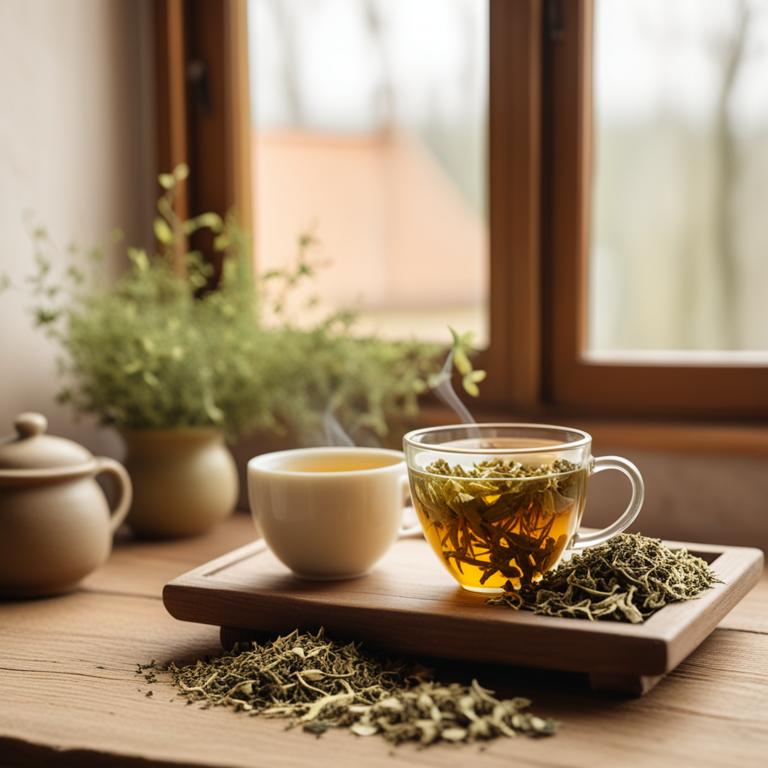
Gymnema sylvestre teas have been traditionally used to treat high cholesterol, and research suggests that they may be effective in lowering cholesterol levels due to their ability to inhibit the absorption of dietary cholesterol in the gut.
The bioactive constituents of Gymnema sylvestre teas, including gymnemic acids and gymnensin, have been shown to have a hypolipidemic effect, helping to reduce the levels of low-density lipoprotein (LDL) cholesterol in the blood.
By reducing the levels of LDL cholesterol, Gymnema sylvestre teas may help to lower the risk of cardiovascular disease and improve overall cardiovascular health.
The benefits of using Gymnema sylvestre teas to treat high cholesterol include a reduction in the risk of heart disease, improved lipid profiles, and a potential decrease in the need for prescription medications.
2. Curcuma longa teas

Curcuma longa teas have been traditionally used to treat high cholesterol levels due to their potential ability to lower LDL cholesterol and triglyceride levels, making them a promising herbal remedy for this condition.
The bioactive constituents of Curcuma longa, including curcuminoids and polyphenols, are believed to contribute to its cholesterol-lowering properties by inhibiting the activity of enzymes involved in cholesterol synthesis and enhancing the expression of genes involved in lipid metabolism.
The polyphenolic compounds in Curcuma longa teas may also help to reduce inflammation and oxidative stress, which are known to contribute to the development of high cholesterol.
Regular consumption of Curcuma longa teas has been associated with several benefits, including improved lipid profiles, reduced risk of cardiovascular disease, and enhanced overall cardiovascular health.
Related Study
According to "Indian journal of physiology and pharmacology", Curcuma longa teas for high cholesterol have been found to have cholesterol and triglyceride lowering activity, with Curcuma longa exhibiting a reduction of 85% in cholesterol and 88% in triglyceride levels in triton-induced hyperlipidaemic rats.
3. Zingiber officinale teas

Zingiber officinale teas, also known as ginger tea, have been traditionally used to help treat high cholesterol due to their anti-inflammatory and antioxidant properties.
The bioactive constituents of ginger tea, including gingerols and shogaols, have been shown to help reduce inflammation in the body, improve lipid profiles, and enhance cardiovascular health.
By reducing inflammation and improving lipid profiles, Zingiber officinale teas can help to lower LDL cholesterol levels and increase HDL cholesterol levels, thereby reducing the risk of heart disease.
The benefits of using Zingiber officinale teas to treat high cholesterol include improved cardiovascular health, reduced risk of heart disease, and a natural alternative to pharmaceutical medications.
Related Study
According to the given study, Zingiber officinale teas, as part of the Zingiberaceae family, may help reduce triglyceride levels, which can be beneficial in managing high cholesterol.
4. Panax ginseng teas

Panax ginseng teas have been traditionally used to treat high cholesterol ailments due to their adaptogenic properties, which help the body adapt to stress and promote overall well-being.
The bioactive constituents present in Panax ginseng teas, including ginsenosides and saponins, have been found to have a positive effect on lipid metabolism, reducing the levels of low-density lipoprotein (LDL) cholesterol and triglycerides in the blood.
Regular consumption of Panax ginseng teas has been shown to improve cardiovascular health by enhancing the function of the endothelium, reducing inflammation, and modulating the lipid profile, ultimately leading to a reduced risk of atherosclerosis and other cardiovascular diseases.
The benefits of using Panax ginseng teas to treat high cholesterol include improved lipid profiles, enhanced cardiovascular health, and reduced risk of cardiovascular events, making it a potential natural remedy for individuals seeking alternative treatments.
Related Study
According to "Bioorganic & medicinal chemistry letters", Panax ginseng teas for high cholesterol may be beneficial due to the sapogenins present in ginseng saponins, which strongly inhibit microsomal acyl-CoA:cholesterol acyltransferase (ACAT), contributing to lowered serum total cholesterol levels.
5. Aloe vera teas
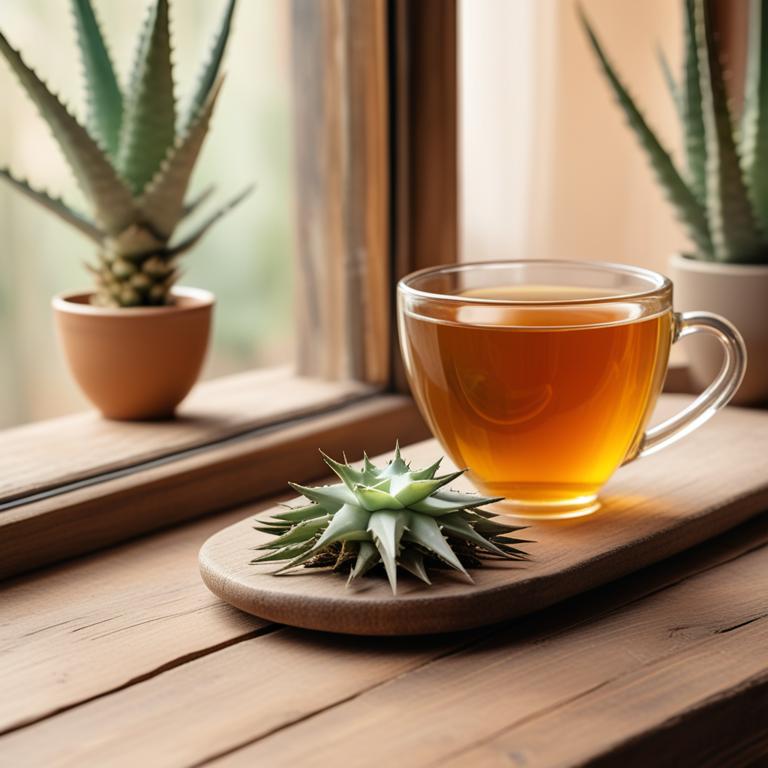
Aloe vera teas have been studied for their potential in treating high cholesterol levels due to their anti-inflammatory and antioxidant properties.
The bioactive constituents, including aloin and aloe-emodin, help to reduce triglyceride and LDL cholesterol levels by inhibiting the absorption of dietary cholesterol and improving lipid metabolism.
Aloe vera teas may also help to improve cardiovascular health by reducing blood pressure and preventing the formation of blood clots.
Regular consumption of aloe vera teas has been associated with lower cholesterol levels and reduced risk of cardiovascular disease, making it a promising herbal remedy for managing high cholesterol.
Related Study
According to "Angiology", Aloe vera teas for high cholesterol may help reduce total serum cholesterol, serum triglycerides, and fasting and post prandial blood sugar levels, while increasing HDL levels, in addition to reducing the frequency of anginal attacks.
6. Cynara scolymus teas
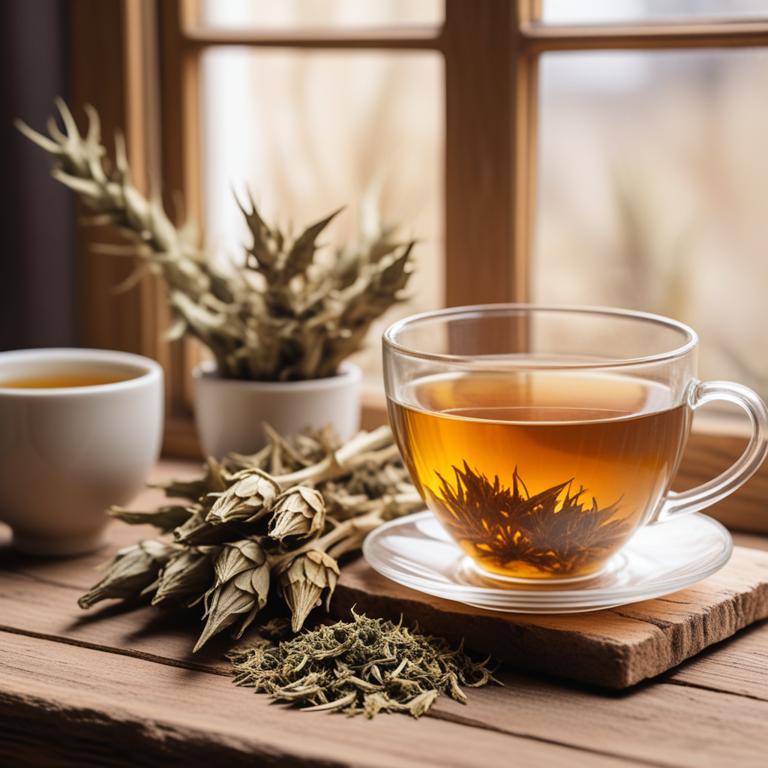
Cynara scolymus teas, also known as artichoke tea, have been traditionally used to treat high cholesterol due to their ability to lower lipid levels in the blood.
The herbal preparation contains bioactive constituents such as cynarin and silymarin, which help to enhance the excretion of bile acids, thereby reducing the amount of cholesterol produced in the liver.
This process, known as bile acid sequestration, is a key mechanism by which Cynara scolymus teas help to lower cholesterol levels and treat high cholesterol.
Regular consumption of artichoke tea has been shown to have various benefits, including reduced total cholesterol and LDL levels, improved lipid profiles, and overall cardiovascular health.
7. Rosmarinus officinalis teas

Rosmarinus officinalis teas have been traditionally used to treat high cholesterol due to their ability to lower lipid levels in the blood.
This herbal preparation is rich in bioactive constituents such as carnosic acid, rosmanol, and ursolic acid, which help to inhibit the absorption of dietary cholesterol and reduce the production of low-density lipoprotein (LDL) cholesterol.
By reducing the levels of LDL cholesterol and increasing the levels of high-density lipoprotein (HDL) cholesterol, Rosmarinus officinalis teas help to prevent the formation of atherosclerotic plaques and reduce the risk of cardiovascular disease.
Regular consumption of Rosmarinus officinalis teas can lead to improved lipid profiles, reduced triglyceride levels, and overall cardiovascular health.
8. Silybum marianum teas

Silybum marianum teas, also known as milk thistle tea, have been traditionally used to treat high cholesterol levels due to their unique properties that help to lower lipid profiles and prevent the formation of atherosclerotic plaques.
The bioactive constituents of this herbal preparation, including silymarin and flavonoids, have been found to possess antioxidant and anti-inflammatory properties that help to protect the liver and improve lipid metabolism, thereby reducing cholesterol levels in the blood.
By inhibiting the activity of HMG-CoA reductase, an enzyme involved in cholesterol synthesis, silymarin and other bioactive constituents of Silybum marianum teas help to reduce the production of cholesterol in the liver, leading to a decrease in circulating cholesterol levels.
The benefits of using Silybum marianum teas to treat high cholesterol include improved lipid profiles, reduced risk of cardiovascular disease, and enhanced overall liver health.
Related Study
According to the information provided, Silybum marianum teas containing silibinin have been shown to lower levels of triglyceride (TG), cholesterol, low-density lipoprotein (LDL), and improve the levels of high-density lipoprotein (HDL).
9. Foeniculum vulgare teas

Foeniculum vulgare teas, also known as fennel tea, have been traditionally used to treat high cholesterol levels due to their ability to lower lipid profiles and prevent atherosclerosis.
The bioactive constituents of fennel tea, such as volatile oils (anethole, fenchone, and limonene), flavonoids, and phenolic acids, possess antioxidant, anti-inflammatory, and lipid-lowering properties that help to treat high cholesterol.
The flavonoids present in fennel tea, specifically kaempferol and quercetin, have been shown to inhibit the activity of HMG-CoA reductase, an enzyme involved in cholesterol synthesis, thereby reducing the levels of low-density lipoprotein (LDL) cholesterol in the blood.
Regular consumption of fennel tea has been found to have beneficial effects on cardiovascular health by improving lipid profiles, reducing inflammation, and preventing the formation of atherosclerotic plaques.
10. Cichorium intybus teas
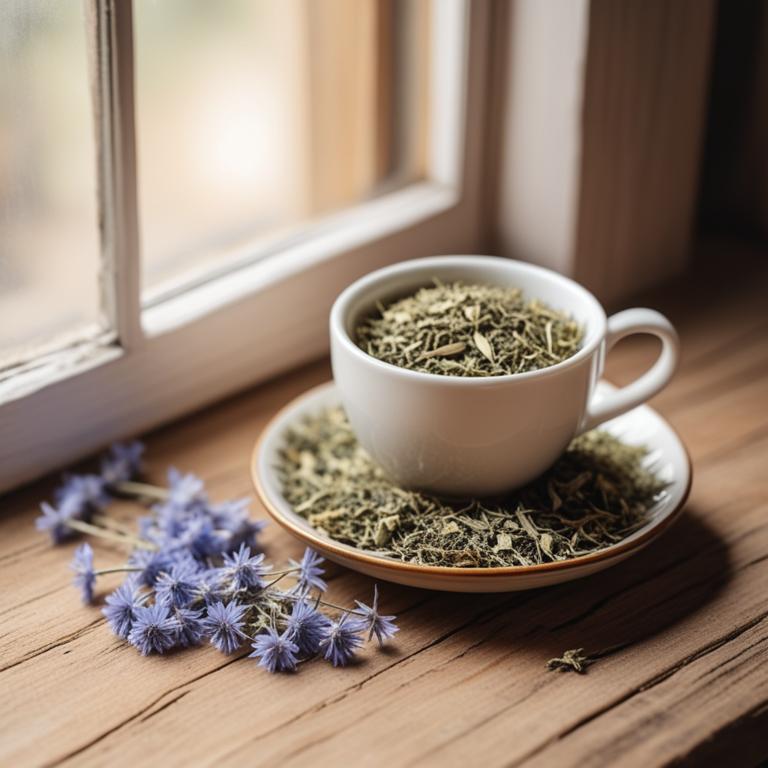
Cichorium intybus teas, also known as chicory root tea, have been traditionally used to treat high cholesterol levels due to their unique properties that help to reduce cholesterol production in the liver and improve lipid profiles.
The bioactive constituents of chicory root tea, such as inulin, saponins, and flavonoids, are responsible for its cholesterol-lowering effects by inhibiting the absorption of dietary cholesterol and promoting the excretion of bile acids.
Regular consumption of chicory root tea has been shown to help lower total cholesterol and LDL (bad) cholesterol levels, while also increasing HDL (good) cholesterol levels, ultimately contributing to a reduced risk of cardiovascular diseases.
By incorporating chicory root tea into one's diet, individuals can reap the benefits of a natural and safe herbal remedy that helps to maintain healthy cholesterol levels and overall cardiovascular well-being.
11. Cassia auriculata teas
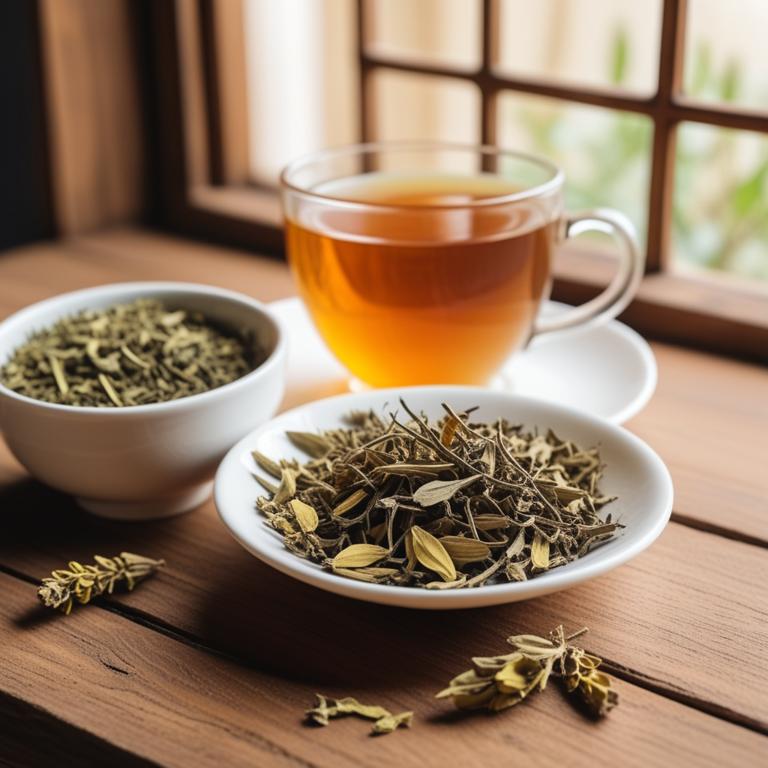
Cassia auriculata teas have been traditionally used to treat high cholesterol levels due to their antioxidant and anti-inflammatory properties, which help to reduce the formation of foam cells and decrease the levels of low-density lipoprotein (LDL) cholesterol in the blood.
The bioactive constituents of Cassia auriculata teas, including flavonoids, phenolic acids, and saponins, contribute to their cholesterol-lowering effects by inhibiting the activity of HMG-CoA reductase, a key enzyme involved in cholesterol synthesis.
Drinking Cassia auriculata teas regularly can help to reduce the risk of cardiovascular diseases associated with high cholesterol levels, such as atherosclerosis and heart attacks.
The benefits of using Cassia auriculata teas to treat high cholesterol include improved lipid profiles, reduced inflammation, and enhanced cardiovascular health, making it a valuable herbal remedy for individuals with high cholesterol levels.